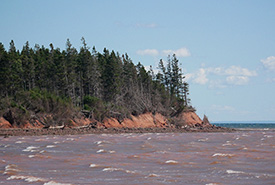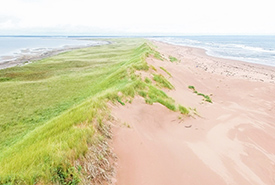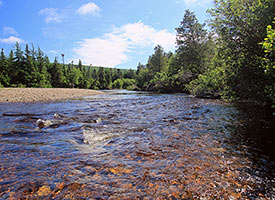Giving away a legacy

Ephraim Island, NB (Photo by NCC)
A source of great joy in my work at the Nature Conservancy of Canada (NCC) is learning the stories behind the lands that we protect. Perhaps the most touching stories are the lands that are donated to NCC.
I have come to appreciate that, as Canadians, we have strong connections to the iconic landscapes that span our country. For some Canadian families, ties to the land they own span generations. These places hold deep meaning borne from childhood adventures, interactions with plants and animals, family gatherings or simply treasured views through a living room window. These memories and experiences create special connections to nature. They also instil a desire to ensure that the land remains wild for generations to come.
In my role as NCC’s government relations manager, much of my time is spent working on projects related to our successful partnership with the Government of Canada and the Natural Heritage Conservation Program. I am happy to know that governments are finding other creative solutions to increasing the amount of protected land in Canada.
While all levels of government in Canada create and manage publicly protected areas for people to enjoy, private conservation organizations like NCC are working hard to conserve privately owned land in local communities. In 1995, the Government of Canada recognized a need to inspire Canadians to work with private conservation organizations to conserve more privately held land. And with that, the Ecological Gifts (EcoGift) Program was born.
The program boils down to a tax incentive for private landowners who donate ecologically sensitive land or place a conservation agreement on their property that is then held by a qualified conservation organization like NCC. Landowners that participate in the program then receive tax benefits for their donation.

The Cascumpec Sandhills, PEI (Photo by Sean Landsman)
The program has been an overwhelming success. Since its inception in 1995, it has inspired more than 1,500 gifts of land across Canada, valued at more than $900 million. Land donated through this program means nearly 200,000 hectares (more than 494,210 acres) of land and fresh water have been protected, including habitat for many of Canada’s species at risk. It also means a cleaner environment and the protection of the services that these properties provide to local communities, such as cleaner water, carbon storage, a decreased risk of flooding and protection from storm surges. Canadian communities have benefited tremendously from this effective incentive program.
NCC is proud to be the recipient of the 1,500th ecogift, a parcel of land on Ephraim Island in New Brunswick, generously donated to NCC by Glen Campbell and his wife, Jane-Anne Campbell.. As one of Canada’s leading conservation organizations, NCC is the proud recipient of more than 325 donations through the program. When counted together, these generous gifts total more than 140,000 hectares (345,947 acres) added to existing networks of protected areas in all 10 provinces.

Barachois Brook Nature Reserve, NL (Photo by Aiden Mahoney)
Included in these donation are some of my favourite NCC projects, like the Cascumpec and Conway Sandhills in PEI, Barachois Brook in Newfoundland, the Hansen Ranch in Alberta and the Chase Woods Nature Preserve in British Columbia.
Canadians are committed to conserving the lands that we hold dear. The Ecological Gifts Program is a great example of conservation organizations — like NCC — and government partners bringing Canadians together to do more for nature. Through the program, many Canadians have found a way to protect land with deep meaning and create a lasting legacy for individuals and families. What’s more, these gifts of land have inspired others to make similar contributions. Long may it continue.
Learn more about the Ecological Gifts Program here

